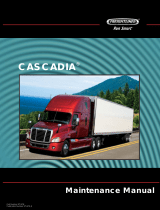Page is loading ...

350 S. St. Charles St. Jasper, In. 47546
Ph. 812.482.2932 Fax 812.634.6632
www.ridetech.com
Part # 11326110
78-88 GM “G” Body Rear CoilOver Kit
HQ Series
Shock Assembly:
2 982-10-802 5” stroke HQ Series shock
2 815-05-022 1.7” Eyelet –adjustable
4 90001994 .625” bearing
8 90001995 Bearing snap ring
Components:
2 59120150 Coil spring – 12” long / 150 # rate
2 803-00-199 Spring retainer kit
8 90002043 Aluminum spacer - .5” I.D.
4 70010828 Delrin Spring Washer
2 90002327 Upper shock bracket
1 90002325 Driver side lower shock bracket
1 90002326 Passenger side lower shock bracket
2 90002158 Lower Shock Bracket
Hardware:
4 99311001 5/16”-18 x 1” Gr. 5 bolt Upper bracket to frame
4 99312003 5/16”-18 Nylok nut Upper bracket to frame
8 99313002 5/16” SAE flat washer Upper bracket to frame
2 99501027 1/2"-13 x 3 ¾” Gr. 5 bolt Shock bracket to trailing arm bracket
6 99501002 1/2"-13 x 1 ½” Gr.5 bolt Shock bracket
4 99501003 1/2"-13 x 2 ½” Gr. 5 bolt Shock to upper & lower brackets
12 99502001 1/2"-13 Nylok nut Lower shock bracket
8 99503001 1/2" SAE flat washer Lower shock bracket

Installation Instructions
1. Raise and safely support the vechile by the frame rails.
2. Using a jack, slightly raise the axle approximately 1”. Remove the shock absorbers.
3. Lower the axle down enough to remove the coil springs.
4. The exhaust tail pipes may need to be removed and/or modified for Shockwave installation.
5. Fasten the new upper shock
bracket into the factory shock
location using the 5/16” x 1” bolts, flat
washers and Nylok nuts supplied.
Note: Position the bracket to offset
the shock toward the center of the
car.
6. Remove the lower trailing arm
mounting bolt. (Do one side at a
time to keep the axle from rotating).
7. Place the new lower shock
bracket up against the factory lower
shock bracket. Use a ½” x 1 ½” bolt,
Nylok nut and flat washers to fasten
the new bracket to the factory
bracket. Install the longer ½” x 3 ¾”
bolt through the lower trailing arm
mount, secure w/ the supplied flat
washers and Nylok nuts.

9. Install the aluminum spacers into
the upper and lower eyes of the
shock.
8. Install the Lower Bolt on Shock
Bracket in the top 2 holes using (2)
½” x 1 ½” Hex Bolts, and (2) ½”
Nylok Nuts.
The lower Bracket has 3 holes. The
top 2 holes are the holes that the kit
will normally use. If a lower ride
height is desired, the bottom 2 holes
can be used.

9. Fasten the shock to the upper
bracket using a ½” x 2 ½” bolt and
Nylok nut.
10. Fasten the ShockWave to the
lower bracket using a ½” x 2 ½” bolt
and Nylok nut.
12. Double check CoilOver
clearances throughout full
suspension travel.
13. Ride height on this shock is
14.5” from center eye to center eye.

Ride Height
We have designed most cars to have a ride height of about 2” lower than factory. To achieve the best ride
quality & handling, the shock absorber needs to be at 40-60% overall travel when the car is at ride height. This
will ensure that the shock will not bottom out or top out over even the largest bumps. Measuring the shock can
be difficult, especially on some front suspensions. Measuring overall wheel travel is just as effective and can
be much easier. Most cars will have 4-6” of overall wheel travel. One easy way to determine where you are
at in wheel travel is to take a measurement from the fender lip (center of the wheel) to the ground. Then lift
the car by the frame until the wheel is just touching the ground, re-measure. This will indicate how far you are
from full extension of the shock. A minimum of 1.5” of extension travel (at the wheel) is needed to ensure that
the shock does not top out. If you are more than 3” from full extension of the shock then you are in danger of
bottoming out the shock absorber.
Adjusting Spring Height
When assembling the CoilOver, screw the spring retainer tight up to the spring (0 preload). After entire
weight of car is on the wheels, jounce the suspension and roll the car forward and backward to alleviate
suspension bind.
• If the car is too high w/ 0 preload then a smaller rate spring is required. Although threading the spring
retainer down would lower the car, this could allow the spring to fall out of its seat when lifting the car by
the frame.
• If the car is too low w/ 0 preload, then preload can then be added by threading the spring retainer up to
achieve ride height. On 2.6” - 4” stroke shocks, up to 1.5” of preload is acceptable. On 5-7” stroke
shocks, up to 2.5” of preload is acceptable. If more preload is needed to achieve ride height a stiffer
spring rate is required. Too much preload may lead to coil bind, causing ride quality to suffer.

/

